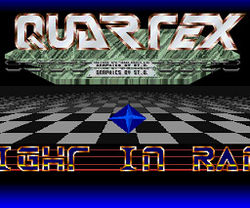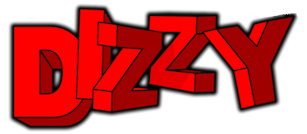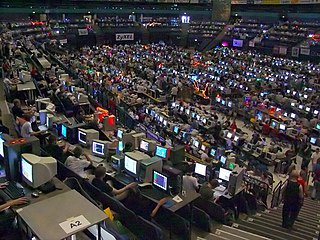
Amiga demos are demos created for the Amiga home computer.

A crack intro, also known as a cracktro, loader, or just intro, is a small introduction sequence added to cracked software. It aims to inform the user which "cracking crew" or individual cracker removed the software's copy protection and distributed the crack.

Demogroups are teams of demosceners, who make computer based audio-visual works of art known as demos. Demogroups form a subculture collectively known as the demoscene.

The demoscene is an international computer art subculture focused on producing demos: self-contained, sometimes extremely small, computer programs that produce audiovisual presentations. The purpose of a demo is to show off programming, visual art, and musical skills. Demos and other demoscene productions are shared, voted on and released online at festivals known as demoparties.

Future Crew was a Finnish demogroup that created PC demos and software, active mostly between 1987 and 1994.

Dizzy is a series of video games, created by the Oliver Twins and published by Codemasters. It was one of the most successful British video game franchises of the late 1980s and early 1990s. Originally created for the ZX Spectrum and Amstrad CPC, the series appeared on multiple home computer and video game console formats, with over a dozen games being published between 1987 and 1992.

The Assembly demoparty is a demoscene and gaming event in Finland. It is the biggest demoscene party. The main organizers of the event are Pekka Aakko and Jussi Laakkonen. The Summer event takes place every year between late July and early August, and lasts three to four days, and the Winter event is held in January or February. Edition 2020 was online. The most recent Assembly was held from 3 to 6 of August 2023 at Messukeskus in Helsinki.

The Commodore 64 (C64) demos are demonstrations of what can be done to push the limits of the Commodore 64 computer, made by programmers, musicians and artists.
Gustaf Grefberg is a Swedish musician. As part of the demoscene, he is known under the artist name Lizardking, and much of his production is tracker music. He is or has been a member of the demo groups Alcatraz, The Silents, Razor 1911, The Black Lotus and Triton. He and Joakim Falk invented a musical style called Doskpop and he released various music disks such as "Doskpop The Compilation" or "Memorial Songs 1+2" which feature many tracks in this style. He also took part in projects such as Merregnon and the Symphonic Game Music Concert-series in Leipzig, Germany.

FairLight (FLT) is a warez and demo group initially involved in the Commodore demoscene, and in cracking to illegally release games for free, since 1987. In addition to the C64, FairLight has also migrated towards the Amiga, Super NES and later the PC. FairLight was founded during the Easter holiday in 1987 by Strider and Black Shadow, both ex-members of West Coast Crackers (WCC). This "West Coast" was the west coast of Sweden, so FairLight was initially a Swedish group, which later became internationalized. The name was taken from the Fairlight CMI synthesizer which Strider saw Jean-Michel Jarre use on some of his records.

Cannon Fodder is a series of war themed action games developed by Sensible Software, initially released as Cannon Fodder for the Commodore Amiga. Only two games in the series were created by Sensible, but were converted to most active systems at the time of release. A sequel, Cannon Fodder 2, was released in 1994 for Amiga and DOS. A third game, Cannon Fodder 3, was made by a Russian developer and released in English in 2012.

Module file is a family of music file formats originating from the MOD file format on Amiga systems used in the late 1980s. Those who produce these files and listen to them form the worldwide MOD scene, a part of the demoscene subculture.
keWlers is a Finnish demogroup, formed in the early 1990s, originally called Mewlers. After smaller releases such as Tripfish 2 or Another High-Caliber Mechanical Complication, their breakthrough came in 2002 when they released their critically acclaimed demo Variform at Assembly 2002. Despite only achieving third place, the demo became one of the most widely known and top rated demos ever released, winning three Scene.org awards. Further major demos to be released later included Protozoa and A Significant Deformation Near The Cranium, released at Assembly 2003. Kewlers have been nominated for at least one Scene.org Award every year, except for 2004. The group disbanded for a while in 2006 directly after the release of their final demo, 1995. But since 2010 Kewlers have returned from their hiatus, with possibly Variform 2, released at Revision 2012, as their most influential demo since their comeback.
The Humble Guys (THG) were a cracking group for the IBM PC during the late 1980s founded by two friends known by the pseudonyms Candyman and Fabulous Furlough. The group was also noticed in the demoscene for some of their cracktros.

Scene.org is a non-profit organization, providing the currently largest demoscene file repository. It was founded in 1996 by Jaakko "Mellow-D" Manninen, though originally it existed as ftp.fm.org, an FTP-server for releases from the group Five Musicians. In 1997, it re-opened as Scene.org. After the Hornet Archive closed on September 22, 1998, scene.org became the only prominent demoscene-FTP available and quickly became the host of many other releases as well.

Naughty Ones is a platform game for the Amiga and Amiga CD32 released by Interactivision in early 1994. The game was programmed by Jacob Gorm Hansen (Paleface) and the graphics were done by Henrik Mikkelsen (Seen), both from the demo group Melon Dezign. The game originally released for a cost of £25.99 and required 1 MB of storage.

Sensible World of Soccer is a 1994 football video game designed and developed by Sensible Software as the sequel to their 1992 game Sensible Soccer. It combines a 2D football game with a comprehensive manager mode. The game includes contemporary season data of professional football from around the world, with a total number of 1,500 teams and 27,000 players.

Razor 1911 (RZR) is a warez and demogroup founded in Norway, 1985. It was the first ever such group to be initially founded exclusively as a demogroup, before moving into warez in 1987. According to the US Justice Department, Razor 1911 is the oldest software cracking group that is still active on the internet. Razor 1911 ran the diskmag 'Propaganda' until 1995.
Phenomena (PHA) was a Swedish Demogroup making Amiga demos that was productive during the formative years of the Amiga Demoscene founded in 1987.
Mark Knight, also known as TDK and Madfiddler, is a British musician, video game music composer and sound designer. He started out writing chiptune and module file music in the Amiga demoscene, and began his games industry career as a composer in 1992. He continued until 2000 when he moved to sound design, and since 2014 has had a split role as a sound designer and composer culminating by going self employed in 2017.









